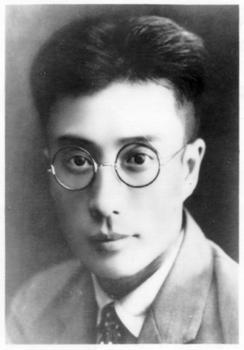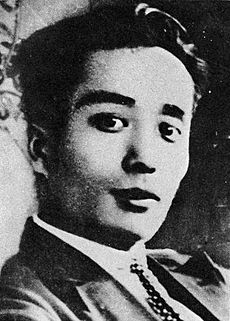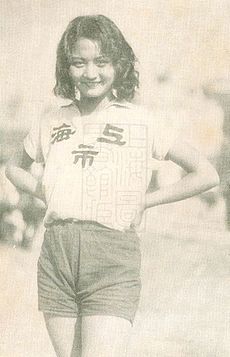Qian Zhuangfei facts for kids
Qian Zhuangfei (Chinese: 钱壮飞; 1895 or 1896 – 1935) was a Chinese doctor and film director. He also worked as a secret agent for the Communist Party of China. In 1927, a political group called the Kuomintang (KMT) started to crack down on Communists in Shanghai. Qian Zhuangfei then secretly joined the KMT's intelligence group.
In 1931, he found a very important message. It said that a top Communist leader, Gu Shunzhang, had been arrested and had switched sides. Qian acted quickly. His actions helped many important Communist leaders in Shanghai escape. This included Zhou Enlai, who later became a very important leader in China. Zhou Enlai said that Qian and two other agents, Li Kenong and Hu Di, were "the three most distinguished intelligence workers of the Party." Qian Zhuangfei died in 1935 during a long journey called the Long March. His daughter, Li Lili, became a famous movie star in the 1930s.
Early Life and Work
Qian Zhuangfei was born Qian Beiqiu (Chinese: 钱北秋) in 1895 or 1896. He was from Huzhou in Zhejiang Province, China. He also used the name Qian Chao (Chinese: 钱潮).
After finishing high school, he went to medical school in Beijing in 1914. He became a doctor in 1919. He worked at a hospital and also had his own doctor's office. He married another doctor named Zhang Zhenhua. Qian also taught about the human body at an art school. He was interested in making movies and sending radio signals. He and his wife helped run a small movie company. In 1926, Qian wrote and directed a film called Invisible Swordsman. His wife and daughter, Qian Zhenzhen (who later became Li Lili), acted in it.
In 1925, Qian and his wife secretly joined the Communist Party of China. They used their movie work and medical practice to hide their secret activities. Their good friend Hu Di also joined the party. The three of them worked closely together. In April 1927, the Kuomintang (KMT) started a big crackdown on Communists in Shanghai. After this, Qian and his wife moved to Kaifeng. They worked for a short time for a military leader named Feng Yuxiang. Then, at the end of 1927, they moved back to Shanghai.
A Secret Agent's Story
In 1929, the Communist leader Zhou Enlai asked Qian to join a special radio training class in Shanghai. This class was run by Xu Enzeng. He was the head of the KMT's Investigation Department. Xu was looking for new secret agents for his department. Qian did very well in the class. He earned the trust of Xu, who was also from Huzhou. Xu made Qian his "confidential secretary." This meant Qian was a very trusted assistant. He became the main person in charge of the KMT's intelligence office in Nanjing. His job was to find and hire more secret agents.
This job helped Qian's fellow Communist agents. His friends Hu Di and Li Kenong were able to join the KMT secret service as hidden agents. Their secret reports helped the Communist Red Army in Jiangxi. These reports helped them stop the first two attacks by Chiang Kai-shek's KMT forces.
On April 24, 1931, something very important happened. Gu Shunzhang, who was in charge of security for Zhou Enlai, was arrested in Wuhan. Gu was on a mission to try and stop Chiang Kai-shek. To save himself, Gu decided to switch sides and join the KMT. He told them everything he knew about the Communist groups. Qian Zhuangfei intercepted a secret message sent by the Wuhan police to the KMT headquarters in Nanjing. He immediately knew how serious the situation was.
Qian sent his son-in-law, Liu Qifu, on a fast train to Shanghai. Liu delivered the information to Li Kenong. Li then told Zhou Enlai and the intelligence chief Chen Geng about Gu's arrest. Because of Qian's quick actions, the top Communist leaders, including Zhou, Li Weihan, Kang Sheng, and Qu Qiubai, were able to escape. However, many other party members could not be warned in time. They were arrested and killed. This included 40 high-ranking members and 800 regular members. It was a huge loss for the Communists. Qian's secret identity was now known. He escaped just before the order to arrest him arrived.
Qian Zhuangfei, along with Chen Geng, Li Kenong, and Hu Di, moved to the Jiangxi Soviet Communist base. There, Li and Qian were in charge of the security forces. Qian also helped by decoding secret messages from the KMT forces that were surrounding them.
Later Life and Impact
In 1934, the Communists had to leave their base in Jiangxi. They began a very long journey known as the Long March. In late March or early April 1935, Qian Zhuangfei died during the Red Army's crossing of the Wu River. This was in Jinsha County, Guizhou.
Zhou Enlai later said that Qian Zhuangfei, Li Kenong, and Hu Di were "the three most distinguished intelligence workers of the Party." He also said that he and other Communist leaders owed their lives to them. Li Kenong was the only one of the three who lived to see the founding of the People's Republic of China. In 1955, he was given the high military rank of general (shang jiang), even though he had not fought in battles.
Family Life
Qian Zhuangfei's daughter, Qian Zhenzhen, was born in June 1915. After Qian had to leave Nanjing for the Communist base, his daughter was adopted by Li Jinhui. Li Jinhui was known as the "father of Chinese popular music." Qian Zhenzhen changed her name to Li Lili. She became one of the most famous movie stars of the 1930s. Some people called her "China's Mae West."
Qian also had two sons, Qian Jiang (钱江) and Qian Yiping (钱一平). Qian Jiang became a well-known cinematographer (someone who films movies) and film director. In 1985, he directed a movie called Night in Jinling. This film was based on the life of his father, Qian Zhuangfei.
 | John T. Biggers |
 | Thomas Blackshear |
 | Mark Bradford |
 | Beverly Buchanan |




